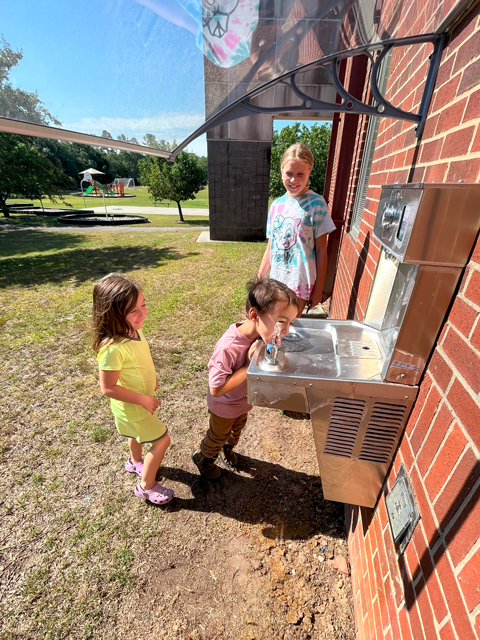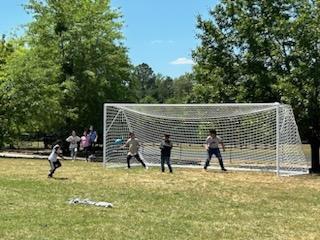
Sometimes, even the best plans run into unexpected challenges, especially during the procurement process. When your mini-grant project doesn’t go as planned, it can be discouraging, but it’s important to remember that setbacks are a normal part of the process. Leaders at Oakwood-Windsor Elementary School in Aiken County found out firsthand how a project of installing an outdoor water fountain/water bottle refill station and soccer goals can have challenges.
Oakwood-Windsor, located just outside of Windsor, South Carolina, is a Title I school with a high poverty rate. Thirty percent of its student population represents the Hispanic community, and many families work multiple jobs to make ends meet. Even though Title I schools receive federal funding for programs and instruction, there are no funds available for improvements to the environment, such as purchasing and installing an outdoor water fountain/water bottle refill station or play equipment.
Due to its rural location, the playground is a busy place in the evenings and on weekends. Unfortunately, it did not have a lot to offer. During school hours, the principal observed her students using cones and other objects to mark imaginary soccer goal lines, and there was a lot of traffic entering and exiting the school building for a drink of water. She wanted to make recess more fun and water more accessible. She also had the community in mind. Her goal was to increase the use of the playground and encourage healthy living among all of the school’s stakeholders.
“When I first got here, there were things that I wanted to be able to provide for my kids, but I just didn’t have the funds to do so. I don’t have an active PTO, and even when we did have one, it wasn’t a big money-making enterprise, if you will, like in other schools. So, I needed to look for different opportunities that were out there,” said Principal Davina Truitt.
In 2021, Principal Truitt learned about the Healthy Eating and Active Living (HEAL) Mini-Grant funding opportunity and wasted no time submitting her application. She said, “I was very shocked and thankful in a wonderful way to learn that we received the grant. But then it went downhill because it took us so long to make it come to fruition.”
Hurdle 1: Grant proposal was partially funded
When Truitt received her award letter, she learned that she would not be receiving the entire budget request of nearly $5,000. Facing limited funds, Principal Truitt did what she knew best. She talked about it. The self-proclaimed Chatty Cathy was honest during casual conversations with community partners who were interested in updates about what was happening at Oakwood-Windsor. Because she cares deeply about her students, she engages with community partners by talking about them, the projects or initiatives that are happening, and the needs and wishes of her school.
“I just shared with a member of the Rotary Club of Aiken Sunrise the excitement that we received this grant, but we don’t have quite the funds. But it’s okay because we’re going to figure it out,” said Truitt, “and they said, ‘You know what? I’m noting this. Let me go back to my board, and we’re going to be in touch.’ And next thing I know, they did a fundraiser because they wanted us to be able to afford everything we needed for this project.”
The Rotary Club of Aiken Sunrise was able to raise more funds than anyone had expected. They matched the amount received from the HEAL Mini-Grant, plus more. According to Truitt, “We were able to get soccer balls and an even nicer set of soccer goals than the ones I initially picked out.”
As to why the grant was partially funded, Wholespire Executive Director Meg Stanley said, “We were trying to fund as many qualifying and good applications as we could. Using the knowledge we had of cost estimates and resources, we decided to partially fund this project. If we could go back and change that, we would. We do not take that approach today because we now know that each school or entity has their own procedures and processes for selecting vendors or equipment. Partial funding can decrease the impact of community projects. However, our funder does have the authority to not fund a specific line item in a proposed budget.”
Hurdle 2: The procurement process has its challenges
The goal of a procurement process is to ensure you get the best value for your budget while ensuring that the quality, timing, and other factors meet an organization’s requirements. When you’re not familiar with your organization’s process, seek advice and guidance from colleagues in the procurement department or, in Oakwood-Windsor’s case, colleagues in the district office.
The Aiken County School District requires at least three quotes from external contractors. You would think that finding a qualified plumber is simple, but that’s not always true. The first quote was easily obtained through the district office’s preferred plumber, but the installation quote was extremely high. Many businesses Truitt reached out to didn’t respond to her request for a quote or the contractor could not fit an onsite visit into their schedule. Truitt turned to community partners for recommendations, but to no avail; she could not get responses.
The key to this hurdle is keeping everyone in the loop. Truitt continued to keep Wholespire and the school district office updated on her progress and the challenges she was facing, which kept Oakwood- Windsor in good standing with Wholespire in spite of the unexpected delays. She eventually found a plumber who provided a quote that fit her budget, but she still needed one more quote. Fortunately, her school district contact understood the challenge, the time invested in getting the second quote, and the fact that she was well beyond the nine-month timeframe of the mini-grant. In the end, the school district contact agreed that she could complete the procurement process with only two quotes.
Hurdle 3: The contractor was difficult to reach
Truitt found her plumber, but there was a small glitch that turned into a big, time-consuming hurdle. After ordering the water fountain/water bottle refill station recommended by the plumber, there was a communication failure. Getting in touch with the contracted plumber was difficult. It took months to reach him.
“It honestly became a bit of a nightmare,” said Truitt. “We tried contacting him by phone but couldn’t leave a voicemail. We would send emails back and forth. We finally got in touch with him, and he partially installed the water bottle refill station.”
Electricity became a factor that the plumber could not address. So, she reached back out to the school district office for guidance, and they sent their electricians to finish the job. Now, it was time to address the soccer goals.
“We worked again with a member of our school district office staff. He’s very knowledgeable about all things playgrounds, and he guided us on purchasing good-quality soccer goals,” said Truitt. “He even helped us put them together and installed the goals.”
It was a long, drawn-out process, but Truitt remained committed to the project, the excitement of her students, and the benefit of the community.
The successes outweigh the challenges
Looking back, the Oakwood-Windsor Elementary School HEAL Mini-Grant project was successful in many ways. First and foremost, the students don’t have barriers to accessing water while outside, giving them more time for outdoor physical activity. They no longer have to imagine soccer goal lines and can kick the balls as hard as they want.

“Our students have already commented on how much more they enjoy going on the playground now that they can play soccer. And, now that our hydration station has been installed and is functional, our students (and visitors to the playground) won’t miss physical activity time by having to go inside or leave the playground altogether to get some water. We have already seen more students being physically active on the playground in the short amount of time they’ve had with the project components.”
Other successes of the project include the school district office being flexible with the procurement process, community partners leveraging funds through a fundraiser, being able to purchase better quality soccer goals and soccer balls, and school district employees completing the water fountain/water bottle filling station and volunteering their time and knowledge on soccer goals and installation.
Asked if she has any advice to other grant recipients, Principal Truitt said, “My words of advice would be to just keep the focus on the purpose of the project and not get discouraged if there are challenges or roadblocks. For us, it was the commitment to providing our Wise Owls with a healthy space to do something they enjoy, playing soccer! Keep reaching out to others who can help your project come to fruition and be persistent.”
Perhaps one last success was the flexibility and understanding of Wholespire. Even though the HEAL mini-grant requires a nine-month implementation time frame, challenges and roadblocks do arise that prevent the project from being completed on time.
“Oakwood-Windsor is not the first mini-grant recipient to face uncontrollable roadblocks that delay project completion. We greatly appreciate Ms. Truitt’s continuous communication with us during the project implementation process. Her communication allowed us to be more understanding and provide explanations to our funder,” said Stanley.
Whether it’s because of challenges you didn’t see coming or changes in the situation, the Oakwood-Windsor hurdles offered valuable lessons. The key is to stay flexible, keep lines of communication open with the funder, and use what you’ve learned to improve future efforts.
The HEAL Mini-Grant is funded by the BlueCross© BlueShield© of South Carolina Foundation, an independent licensee of the BlueCross© BlueShield© Association.

